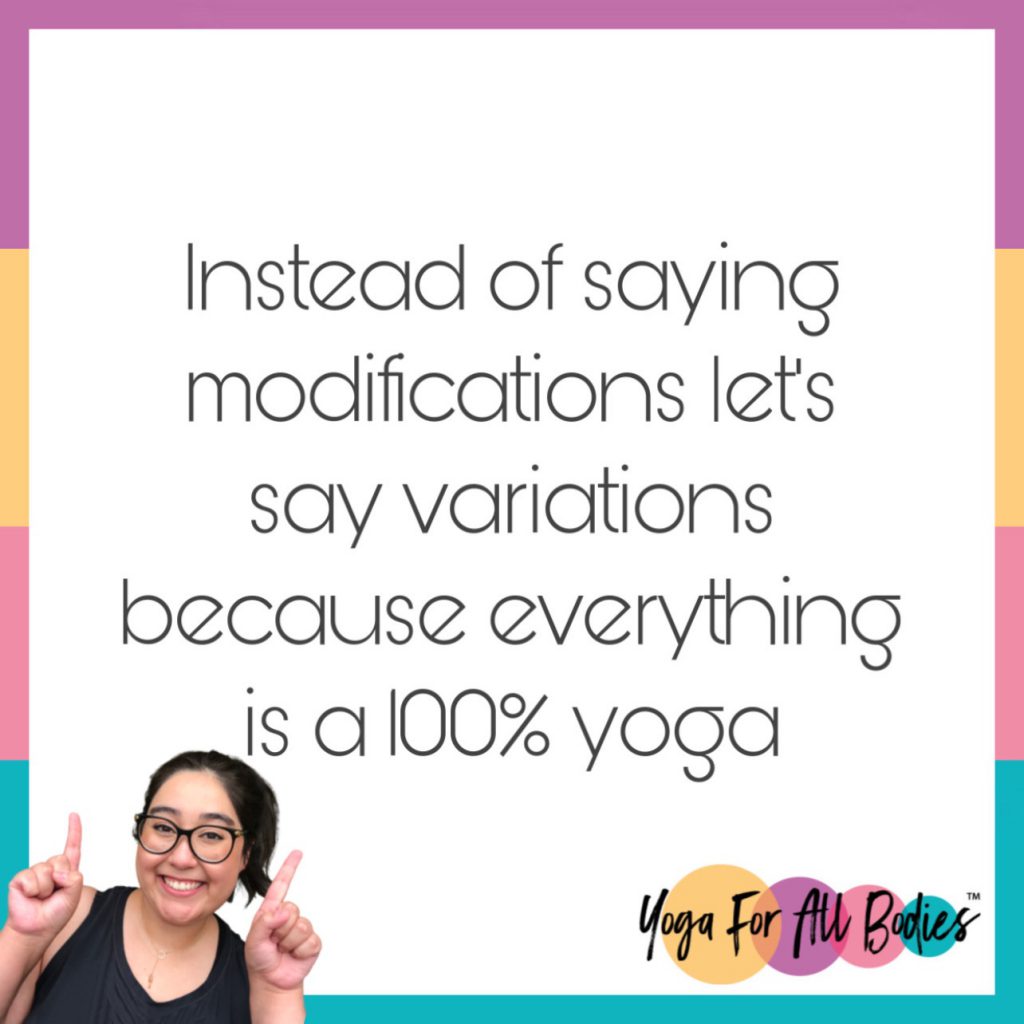This is my motto: Teach with variations, don’t rescue with modifications
I wrote the following article for the Accessible Yoga Blog. You can read the full text below.
Saying “modifications” perpetuates the idea that you’re not doing a 100% yoga, that a full expression of the pose exists, that there is a goal when the invitation of yoga is to be with yourself, with your mind and body in this very moment. That’s why I invite you to say “variations” and not modifications because everything is 100% yoga!

Since I started practicing yoga something happens in my body and mind when a teacher says, “if you need to modify” or “if you can’t do this,” something similar to a knife through the heart. For so long I felt I was doing less, that I wasn’t being able to do and enjoy the “complete expression of the pose,” that I needed to push, work harder in order to achieve that goal of having the gift of doing the complete, full, or traditional posture.
With time, and after becoming a yoga teacher, I’ve come to realize that apart from how “modify” is said (even though it might come from a place of love it can still be a loaded word) it is when it is offered. It is not that per se the word “modify” is wrong, it is because traditionally the “modification” in yoga comes after the teacher realizes someone is struggling or “can’t do” the traditional version of the pose offered.
This is when things start to get weird, students are singled out, maybe offered some props to go to the rescue (even though those props should have been available and the teachers should have taught how to use them from the beginning), or even worse, students are left out, unseen because the instructor doesn’t have the tools to offer adequate variations beforehand. Or a teacher is just not interested in giving options because that person “doesn’t belong to the target audience” or their class is not made for that type of student (shockingly, yes, this has been used as an excuse when I’ve asked yoga teachers why they don’t offer choices to students in class.)
That’s why I embrace, promote, and encourage that we use the word variation instead of modification, not necessarily as a synonym, because, at least in the way I teach and share yoga, variations are way deeper than offering a modification when someone can’t do something. They are synonymous with freedom in your practice, they are a way of honoring and meeting the needs of your body and mind.
Every day is going to be different in our bodies and minds, that’s why we need to offer variations, options, exploration, and freedom every single time, without making assumptions, without choosing for our students, it is their practice!
Variations are for all bodies! They are not modifications when someone “can’t do” something, they are choices and freedom for your body and mind. And the beautiful thing about variations is that they are for everybody! Anyone can benefit from choosing for themselves! And this freedom on the mat translates to life, in the way we relate with others, in the way we set boundaries and truly know what we want and what we don’t.
And remember, just because you live in an able body doesn’t mean that you will want to do or you will enjoy the most challenging variation every single practice! Just because you live with a disability doesn’t mean that postures like chaturangas, planks, or inversions will not be available, there’s always a variation for you! You can choose to do a chair practice at any life stage, teenager or senior! You’re the owner of your practice.
As I always say: Your body, your practice, that’s why as yoga teachers we need to offer the opportunity to explore what feels good, and what your body and mind need at this very moment.
Originally written in English and published in The Accessible Yoga Blog. You can read it HERE.
.